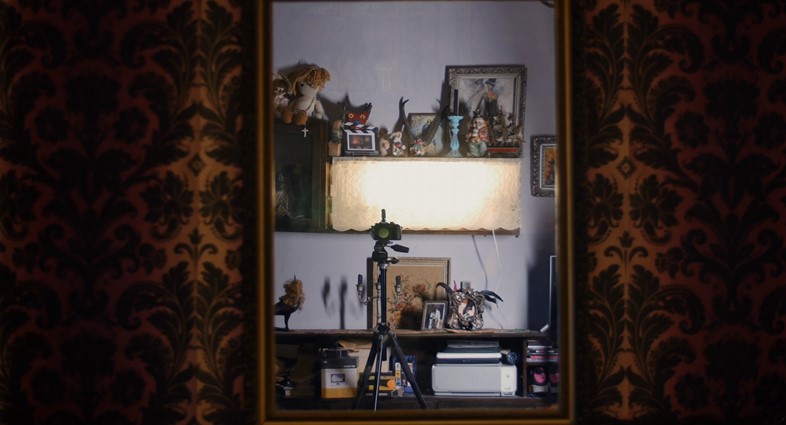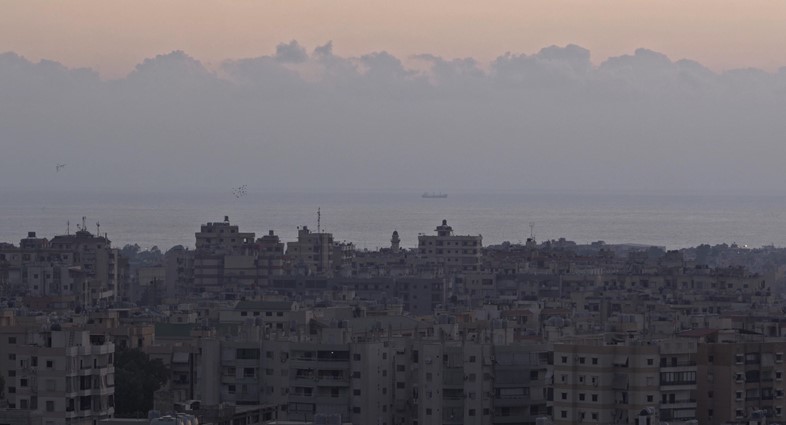Anthony El Chidiac shot Room for a Man entirely from within his bedroom. Speaking to Salma Haidrani, he explains what propelled him to create this autobiographical film
- TextSalma Haidrani
It’s not often we see queer cinema dedicated to the lived experiences of gay men in the Middle East. But that’s what Lebanese-Argentinian director Anthony El Chidiac’s multi-award winning debut feature documentary Room for a Man sets out to do. Screened as part of the BBC Arabic Film Festival last month, the film is shot entirely within the confines of El Chidiac’s bedroom.
It follows El Chidiac coming to terms with his identity and sexuality as he renovates his Beirut bedroom. We see how it serves as a refuge from the hostility and homophobic hate crime he faces in wider contemporary Lebanese society but also how his room also comes to represent powerful symbolism for the gay male experience in the Middle East: El Chidiac is stifled by living on the margins but draws solace from not fearing further attacks.
Given the film’s name, it’s ironic that El Chidiac reveals that he’s “never felt like a man”, largely in part as he doesn’t subscribe to the rigid gender expectations that can be commonplace in the Arab world. It was wrestling with the idea of what being a man meant that propelled him to create the film.

“My family doesn’t think I fit the profile of what a man should be,” he says from his Beirut home. “I don’t earn enough money to handle the house’s responsibilities, I lack knowledge and interest in cars, electricity, plumbing and maintenance tasks and I don’t have the physical strength to protect myself and the house I live in.” It’s any wonder then he ponders: “What’s next for a 20-something guy who’s into men and who lacks any masculine skills to face the real world?”
An integral aspect of the film centres on how El Chidiac’s ancestors are celebrated for their masculinity and physical prowess and how this is relentlessly weaponised against him. In one memorable scene, his unashamedly homophobic uncle encourages El Chidiac to start afresh abroad and discusses in length the “glorious family image... of tough guys” and urges him to “stay out of the frame” so “one of their tree branches [won’t] wither”.
El Chidiac’s hesitation at revealing his lived experiences so candidly to an international audience could be attributed for why the film was seven years in the making. “This period of time was an emotional turmoil as a result of openly addressing my insecurities and sexual orientation,” he says. “Exposing myself became a necessity that I had to pursue despite causing me much distress.”

It’s particularly pertinent that the film is shot in Lebanon, not least as the country’s attitudes towards its LGBTQ+ population is famed for its so-called progressiveness compared to its counterparts. Last June, a Lebanese court ruled that homosexuality isn’t an ‘unnatural offence’ while almost 100 electoral candidates called for the decriminalisation of homosexuality for the first time in its history last May, marking the first high-ranking endorsement of LGBTQ+ protection of its kind in the Middle East. It’s a far cry from the wider Middle East: an Iranian man was executed for having gay sex earlier this year, for one.
Despite the strides Lebanon’s LGBTQ+ communities might have made in recent years, challenges remain: though Lebanon became the first country in the Arab world to host Pride Week in 2017, its organiser was detained.
It’s not uncommon for queer filmmakers in the Middle East to encounter safety challenges screening their films – for Egyptian-American filmmaker Sam Abbas, for one, screening his debut feature The Wedding in Egypt, Turkey, Tunisia and Lebanon in 2018 came with a six-step safety precaution. These included audiences signing an NDA agreement, no cameras and no re-entry. Conversely, though El Chidiac was concerned that the film might be censored by the Internal Security Forces in Lebanon, primarily he was cautious that the film wouldn’t “cause any embarrassment for [my] family”.
El Chidiac stresses that the film isn’t entirely representative of the gay male experience in the Middle East. Even so, it can offer the community solace as their rights in the region have increasingly been eroded. “A lot of gay men identified with the story... [but] I don’t speak for the gay community,” he says. “I think that the film speaks for anyone who feels hopeless about changing his existence but nevertheless finds his own ways to express about it.”
Though El Chidiac hopes he might encourage more queer film in the Middle East at large – “I’d be proud to open doors to a new wave of courageous queer artists” – ultimately, he hopes that he might shed light on the challenges gay men in Lebanon continue to experience as they attempt to live authentically and the crimes committed against them: “I want to narrate... the perspective of different men diving into the night in search of an encounter, despite the fear and the constant threat, a desire where lust, guilt and shame are intertwined and often culminating in acts of humiliation and violence.”
Room for a Man won the Grand Prize for Best International Feature at the Montreal International Documentary Festival (RIDM) in 2017.











